*Angelic choir singing.*
Ah, page one. This is where the money, the clients, and the glory reside.
Literally millions of companies are fighting like cats and dogs to get there. Totally fair, given that 915 out of every 1,000 people don’t even bother to scroll to page two.
So, how do you capitalize? With a little thing called SEO (search engine optimization).
SEO is the process of optimizing your website’s visibility on Google to gain organic, targeted traffic, and ultimately attract new clients for the services you offer.
But good SEO is a multi-piece puzzle.
This guide breaks down 14 SEO for restoration company tips, from water damage SEO to emergency cleanups — all sharpened to rank you higher and win more clients. Let’s go!
Key Takeaways
- Close more leads with a mobile-first website, click-to-call buttons, and clear service pages.
- Become visible locally by strengthening your Google Business Profile, service-area signals, and local reviews.
- Attract time-sensitive clients by targeting urgency-based keywords tied to floods, fires, and mold.
- Increase conversions by adding social proof, insurance mentions, real job photos, and fast contact options.
- Hold page-one rankings long-term by fixing technical SEO, improving site speed, and using internal links correctly.
Built on 30,000+ days of home services experience
This guide walks you through SEO for restoration companies to get you to rank at #1, courtesy of our team of 50+ SEO specialists.
Why Do Restoration Companies Need to Invest in SEO?
SEO is a visibility game. It surfaces your site when a local client Googles for help after a pipe bursts, a fire breaks out, or mold is spotted.
The higher your local search rankings, the better your visibility!
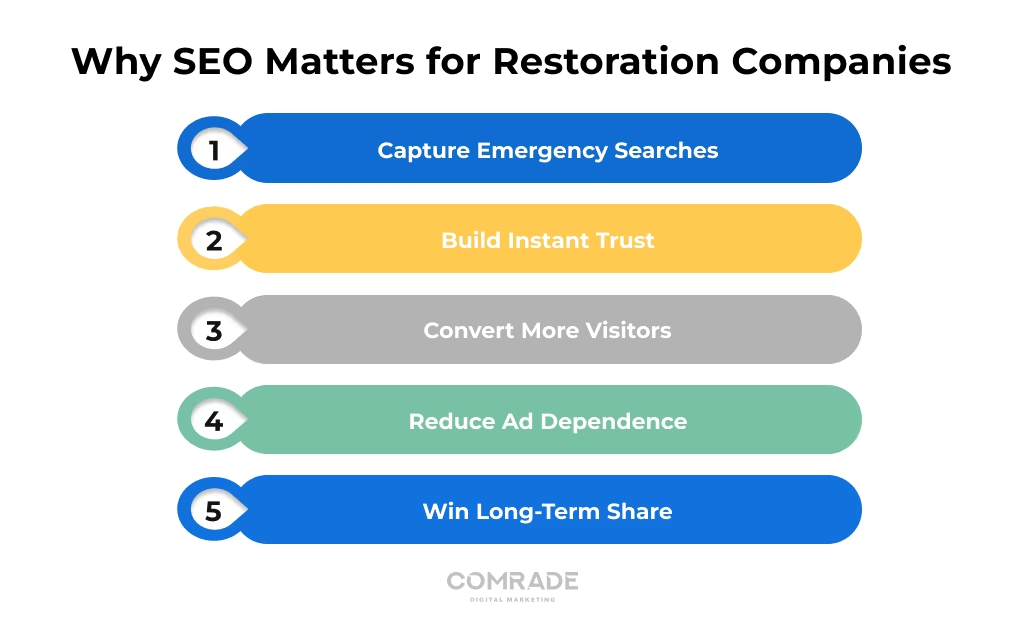
But restoration SEO isn’t about chasing traffic for traffic’s sake. It’s about the real-world wins:
- Getting emergency calls by appearing first when homeowners search during floods, fires, or mold scares.
- Accumulating massive trust by ranking high on Google, where people assume the top search engine results are the safest choice.
- Squeezing more clients from your website with fast load times, clear services, and easy ways to contact you.
- Reducing dependence on paid ads, where the average cost per click is $30 in the home services industry!
- Winning long-term market share by staying visible while your “Johnny-Come-Lately” competitors struggle to oust you.
Quick heads up: 47% of businesses ignore SEO. Big mistake!
CEO of Searchpilot, Will Critchlow, breaks down the concept of “SEO depreciation.” For every year you don’t invest in SEO, you see a 10-20% decline in organic traffic.
Thankfully, you don’t have to figure this out solo. Hire an expert.
While some look for a water damage SEO company specifically, even a general home services SEO team with over 15 years of marketing experience and a track record across 100+ jobs will do!
1. Kick Off with Keyword Research
This is the Yellow Brick Road to your best clients.
Keyword research is the process of finding the exact search terms people use (e.g., “what to do after a pipe bursts” or “water damage restoration near me), understanding the intent behind them, and selecting which to target to attract new clients.
As SEO legend, Neil Patel, points out, “You need to know which keywords will take the least amount of your limited resources to yield the highest ROI.”
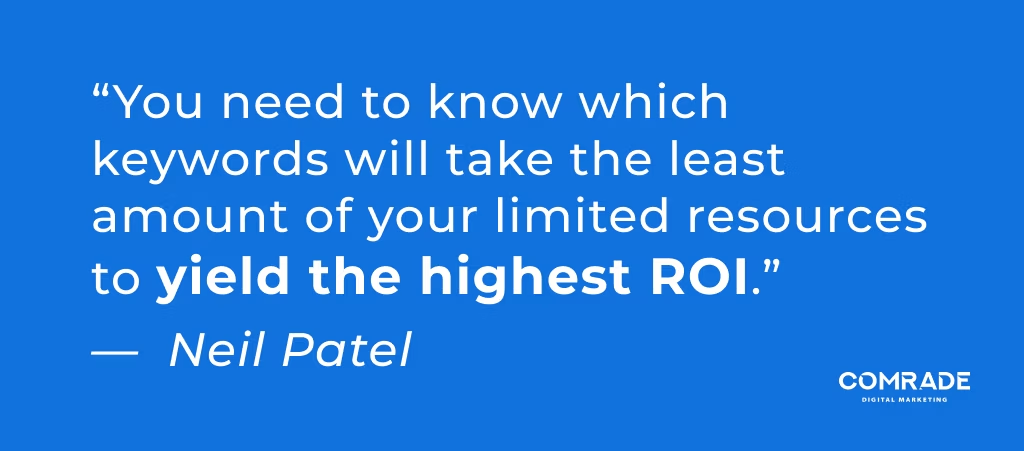
For example, when doing SEO for water damage restoration, you might look up the keyword “water damage company” on Ahrefs or Ubersuggest to check search volume and difficulty.
But it has to be competitive, i.e., enough people should be looking up that keyword!
Below, you can see it has a healthy traffic potential (18K), but with a harder keyword difficulty. Try adding your city to this keyword, and it may be more attainable!

When doing keyword research, you’re basically looking for:
- What people actually search for when water, fire, or mold damage hits
- How competitive those searches are, so you don’t fight losing battles
- What stage they’re in (researching, comparing, or ready to call)
Pro Tip: The real edge comes from long-tail, urgency keywords focused on the first 60 minutes of a disaster.
A short-tail keyword like “water damage restoration” is broad and highly competitive, while a long-tail urgency keyword like “emergency water damage restoration near me” targets people who are actively looking to hire.
Top 40 Real Keywords for Restoration Companies
Think of keywords as “SOS signals” from your potential clients.
When someone Googles them, something’s already wrong! At this stage, they’re looking for help ASAP.
Here are 40 SEO keywords worth tying to your site if you want more calls, jobs, and revenue. Keep going.
| Top 40 SEO Keywords for Restoration Services | ||
| Rank | Keyword | Volume |
| 1 | mold remediation | 80,000 |
| 2 | mold removal | 56,000 |
| 3 | water damage restoration | 52,000 |
| 4 | water damage restoration near me | 50,000 |
| 5 | mold remediation near me | 50,000 |
| 6 | fire damage restoration | 34,000 |
| 7 | water restoration | 32,000 |
| 8 | water damage repair | 28,000 |
| 9 | mold removal near me | 25,000 |
| 10 | black mold removal | 21,000 |
| 11 | water damage restoration services | 17,000 |
| 12 | water mitigation | 15,000 |
| 13 | water extraction | 15,000 |
| 14 | storm damage repair | 11,000 |
| 15 | emergency water removal | 9,800 |
| 16 | restoration company | 8,100 |
| 17 | water damage cleanup | 7,500 |
| 18 | flooded basement cleanup | 7,400 |
| 19 | sewage cleanup | 7,000 |
| 20 | fire damage repair | 5,300 |
| 21 | smoke damage restoration | 5,300 |
| 22 | water damage near me | 5,200 |
| 23 | crime scene cleanup | 5,100 |
| 24 | disaster restoration | 4,800 |
| 25 | biohazard cleanup | 4,600 |
| 26 | fire damage cleanup | 4,300 |
| 27 | restoration companies near me | 3,800 |
| 28 | professional mold remediation | 3,500 |
| 29 | water mitigation company | 3,300 |
| 30 | flood restoration | 3,000 |
| 31 | ceiling water damage repair | 3,000 |
| 32 | commercial water damage restoration | 3,000 |
| 33 | water remediation | 2,700 |
| 34 | flood cleanup | 2,600 |
| 35 | fire and water restoration | 2,300 |
| 36 | basement flood cleanup | 1,900 |
| 37 | mold removal cost | 1,700 |
| 38 | water damage restoration cost | 1,300 |
| 39 | sewage backup cleanup | 1,200 |
| 40 | smoke smell removal | 1,000 |
2. Build Your Restoration Website
This is your biggest muscle. Flex it!
The best restoration websites are built for three things: panic, speed, and mobile.
Puro Clean, for instance, has a clean menu, along with a call number and an AI assistant bot to answer quick questions. Nice!
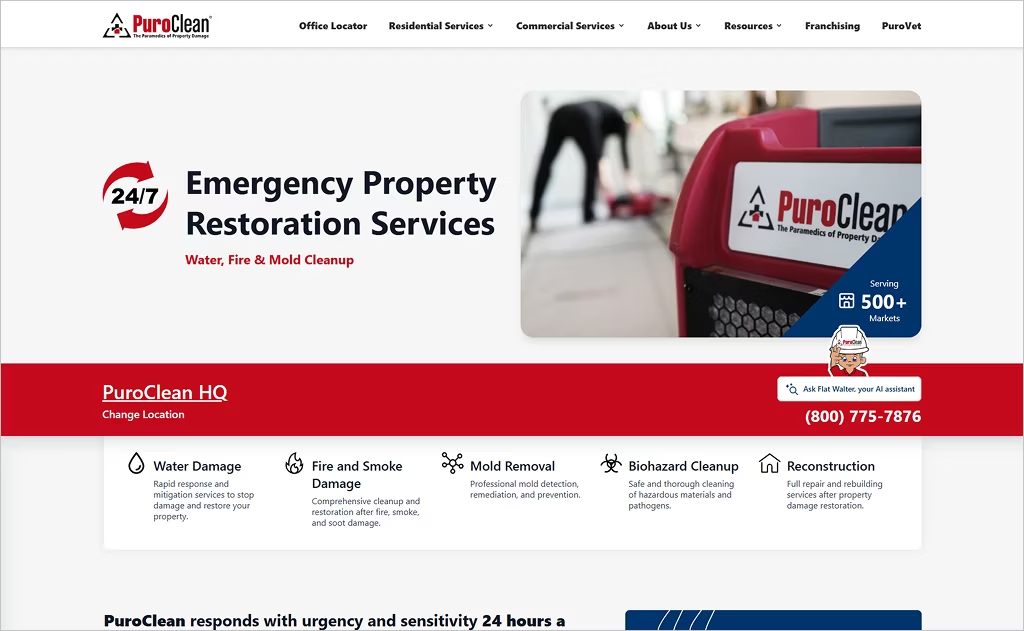
But hey, don’t forget about mobile. 60% of restoration leads come from mobile, often while the homeowner is standing in water or smelling smoke.
A Great Hack: Add a “Text a Tech Now” button that appears only for mobile users.
Texting dramatically lowers friction. For a panicked homeowner, sending “My basement is flooding, can you help?” is ideal. A five-minute intake call is not.
Website Hierarchy (Keep It Clean)
A strong restoration website follows a predictable, intuitive structure. Visitors shouldn’t have to think.
Your restoration contractor website hierarchy should include:
- Service Pages (Water Damage, Fire Damage, Mold, Storm, Biohazard)
- Industries Served (Residential, Commercial, Multi-Family, Healthcare, etc.)
- Local Pages (City and service combinations for coverage areas)
- Blog Pages (Education, insurance guidance, emergency prep)
Each section should be accessible within one to two clicks. Read that again: one to two clicks!
Service Pages (Your Conversion Helper)
Service pages should answer three questions immediately:
- Can you help me right now?
- Do you serve my area?
- Can I trust you?
Lead with urgency, location relevance, and proof.
Local Pages (Capture SOS Searches)
Local pages catch those “SOS” searches with keywords like “water damage cleanup near me” or “emergency mold removal (city).”
46% of all searches have local intent. These are customers near you, looking to hire someone like you.
Local pages should be simple, localized (duh!), and focused on your availability (“24/7 Emergency Water Damage Cleanup in Austin).
Blog Pages (Great Trust Builders)
Blogs aren’t just for SEO. Think about ideas like “Will Insurance Cover Water Damage?” or “What to Do in the First 60 Minutes of Discovering Mold”.
By the time they finish reading, they’re calmer, more informed, and already see you as the expert. And when your Call Now or Text Now button appears, they’re hitting that!
| Lead Generation Tactics | ||
| Tactic | Implementation | Why it Works |
| Sticky Call Button | A “Call Now” button that follows the user as they scroll. | Users in a panic don’t want to hunt for a contact page. |
| The “Trust Stack” | Placing IICRC logos and 5-star review badges near the top of the blog. | Establishes immediate authority for a stressed user. |
| Insurance Integration | Mentioning “We work with all major insurance carriers.” | Removes the financial anxiety barrier immediately. |
| Urgency Banners | A top-of-page banner stating “On-site in 60 minutes or less.” | Addresses the user’s primary need: Speed. |
Building a great restoration website is hard. We won’t deny that. But without one, you’re bringing a knife to a cannonball fight.
Check out the Best Restoration Websites of 2026. You’ll get tons of ideas to build your new site!
3. Leverage Local SEO
Do you serve Chicago? Then, you must rank in Chicago!
No desperate Chicago homeowner with a flooded basement is calling a restoration company in Aurora.
What is local SEO? Local SEO improves your business’s visibility in geographically relevant local search results (like your city!), helping it appear for “near me”, intent-driven queries.
SEO.com found 1.5 billion searches DAILY are “near me” searches, meaning they have local intent.
You need to prove three things to Google to rank locally:
- Relevance (how closely your services match the search)
- Distance (how close you are to the searcher)
- Prominence (how well-known and trusted your business is)
What is the ultimate goal of local restoration SEO? To show up in the Map Pack and get more job inquiries!
For instance, when we Google “mold removal in Chicago”, Moldman Chicago occupies the top Map spot, attracting 17% of all clicks!
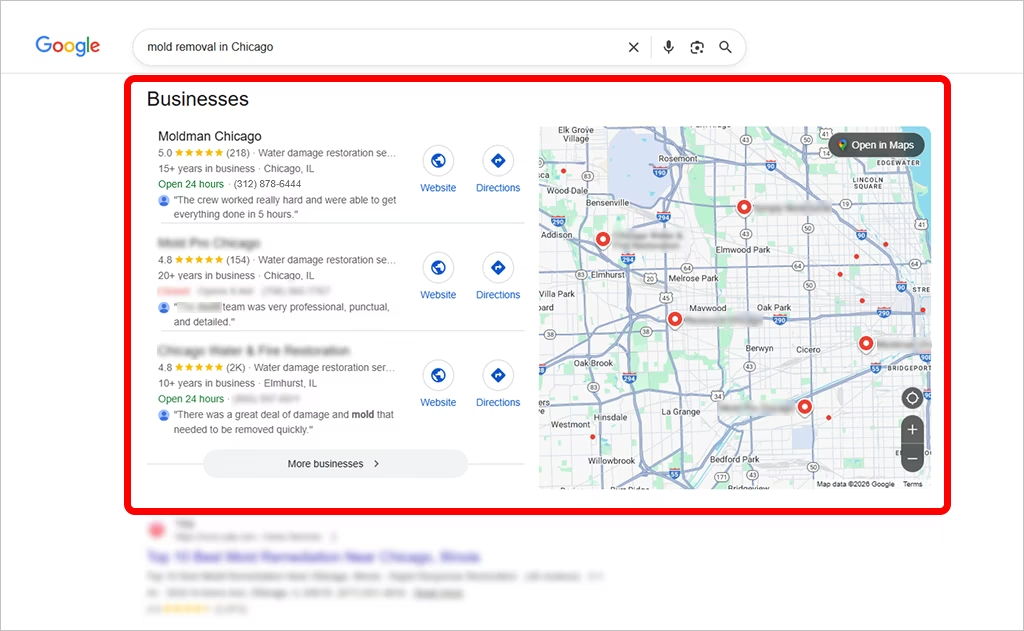
A few handy tricks to make local SEO work:
- Build city-specific service pages: Create location web pages that clearly confirm your hours (54% of mobile users look for this), with unique copy tailored to the city (Pro Tip: Mention landmarks like “near Millennium Park”)
- Target high-intent emergency keywords: Optimize for search terms like “emergency,” “24/7,” “immediate,” and “flooded basement,” combined with the service area.
- Design pages for high-stress users: Use short paragraphs, clear service descriptions, and prominent click-to-call or text options.
- Align content with local risk factors: Publish content tied to regional threats like flash flooding, freeze damage, or storm seasons.
- Surface trust signals: Place reviews, certifications, and insurance information above the fold (i.e., before they scroll).
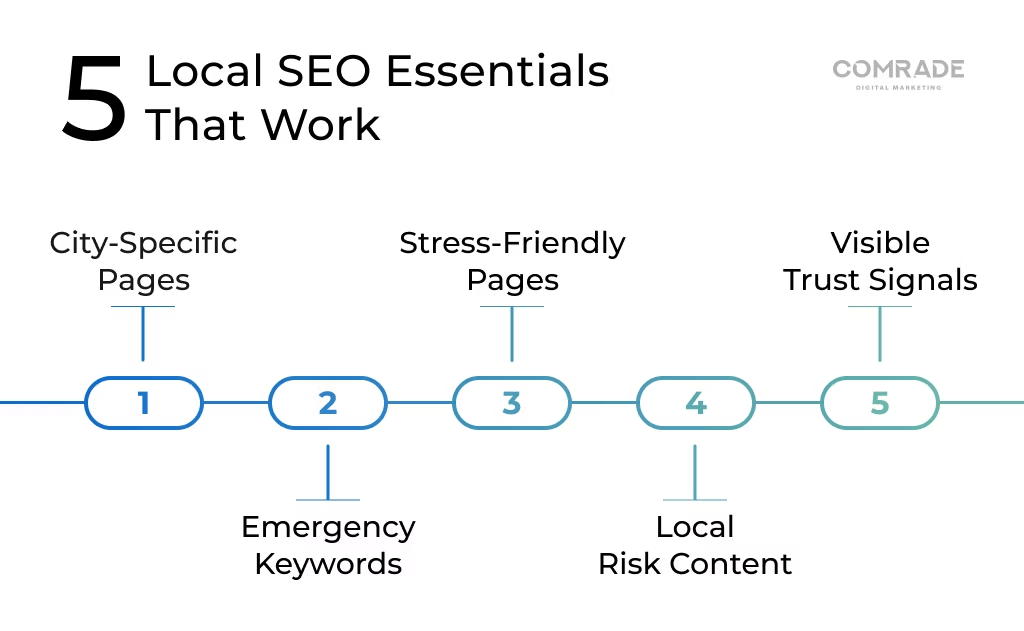
Pro Tip: Search results are NOT universal. For example, when doing local SEO for water restoration:
A search for “water restoration near me” in Miami is different than the same search in Boston (different competitors, search volumes, and levels of keyword difficulty).
Use tools like Ahrefs or Ubersuggest to evaluate local search demand and competition before deciding what to target.
4. Set up Your Google Business Profile
Want to blow up your phone?
Set up a Google Business Profile! This is a FREE business listing that appears on Google Maps.
It shows your hours, location, phone number, reviews, photos, and service details. You could see well over 60% of calls from your GBP alone!
Cool example: When you search “home restoration company Columbus” on Google, you’ll first see a sponsored listing (paid).
Just below that, Thompson Restoration Associates ranks for FREE organically.
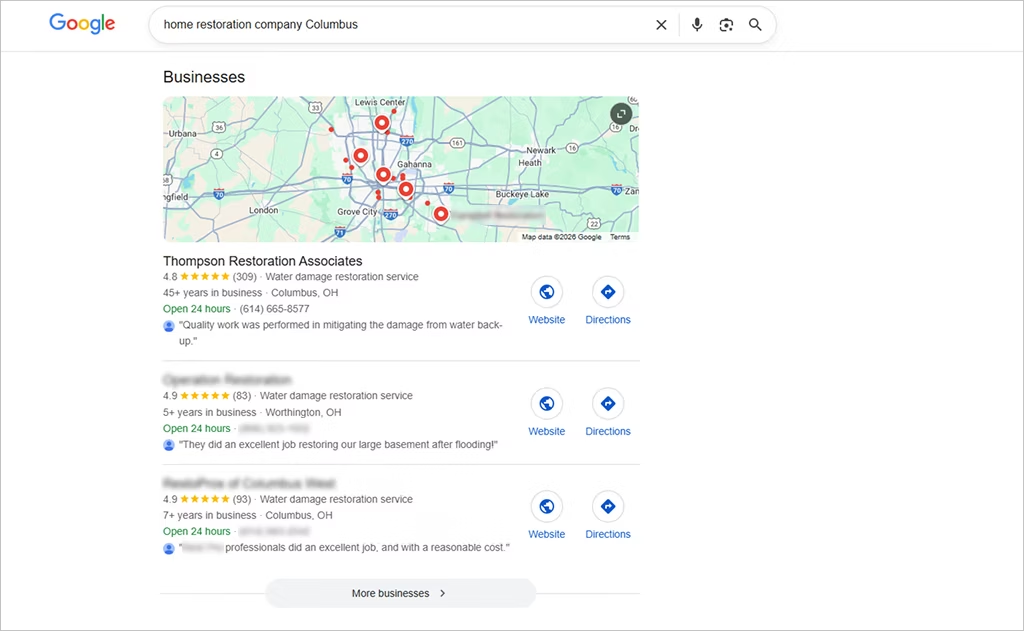
That’s a prime spot! But, how do you even set up a GBP? We break it down:
- Go to the Google Business Profile website and sign in with your Google account
- Search for your business name
- If it exists → claim it
- If it doesn’t → create a new profile
- Choose the correct primary category (e.g., Water Damage Restoration Service)
- Add your service areas (cities, zip codes, counties you actually serve)
- Enter accurate contact details (phone number, website, business hours)
- Verify your business (postcard, phone, email, or video… Google decides)
- Write a clear business description explaining what you do and how fast you respond
- List all core services (water damage, fire, mold, storm cleanup, etc.)
- Upload real photos and videos (trucks, crews, equipment, before/after jobs)
- Turn on messaging or call buttons for fast, mobile-friendly contact
- Start collecting reviews and respond to every single one
It takes 20 minutes tops, and it’s one of the most valuable local SEO favors you can do for yourself. Nail it down now!
5. Update Your NAPs
We’re not talking about your sleep schedule!
Your NAP is your Name, Address, Phone Number, and in SEO for restoration companies, this trio plays a pretty vital role.
SEO.com points out, “Google values consistency. When all your listings say the same thing, Google can confidently display your contact information.”
For example, avoid:
- Listing “ABC Restoration” on one site and “ABC LLC” on another
- Using two different phone numbers
- Showing “123 W Main St.” in one place and “123 West Main Street” in another
Restoration Doctor of Miami, for example, made sure to stay consistent across TrustIndex, MapQuest, and Yelp. Nice attention to detail!
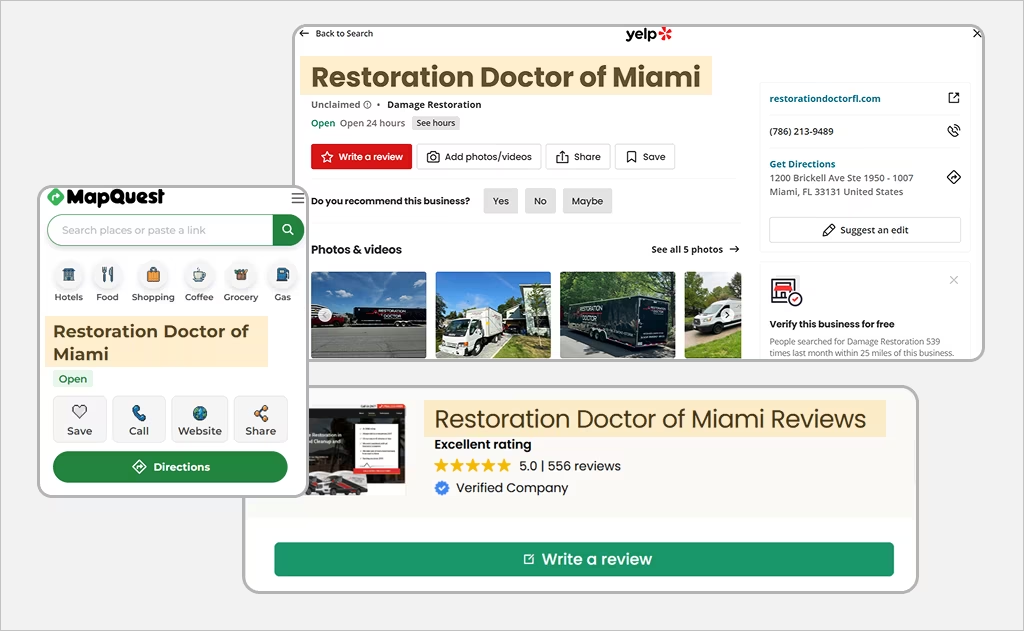
Bright Edge confirms that an inconsistent NAP lowers rankings in the restoration industry, so you’d better get on this ASAP.
Where do you begin? Make your life easier and use Bright Local to audit citations (i.e., where your business name, address, and phone number appear across the web).
6. Stack Client Reviews
98% of people read online reviews.
Psychologically, we trust the “wisdom of crowds,” but it goes so much deeper!
Rivyo asserts, “A single negative review may beat 10 positive ones.” We process negative emotions more strongly than positive ones.
And while there’s no universal number, Olly Olly suggests having at least 75 to 100 reviews to “consistently rank for competitive local keywords.”
- Ask while relief is high: When the client feels grateful, and the stress has passed.
- Remove all friction: Send a direct review link by text or email so the process takes under 1 minute.
- Appeal to their humanity: Let clients know how their input helps others make safer decisions.
- Respond quickly and professionally: A fast, thoughtful response limits the impact of negative bias.
- Build volume steadily: Avoid soliciting reviews in large bursts. A natural, consistent pace is far more credible.
Don’t be shy to ask for a review!
Many people genuinely enjoy sharing their experiences, whether to authentically help or to simply feel more powerful.
Want to grow your revenue faster? Follow our guide to restoration marketing. These tips are used by the top 5%!
7. Create High Quality Content
Content is literally life or death.
Just kidding, but it’s still very important.
Backlinko reports that “Quality Content” is a top 8 ranking factor for Google (out of 200)!)
Paul Davis does a fantastic job with their content. Their home page immediately addresses pain points like “fire, flood, mold, or storm damage” and reinforces “Proudly Serving Tampa.”
They also have 28+ dedicated pages for each service they offer. Well done!
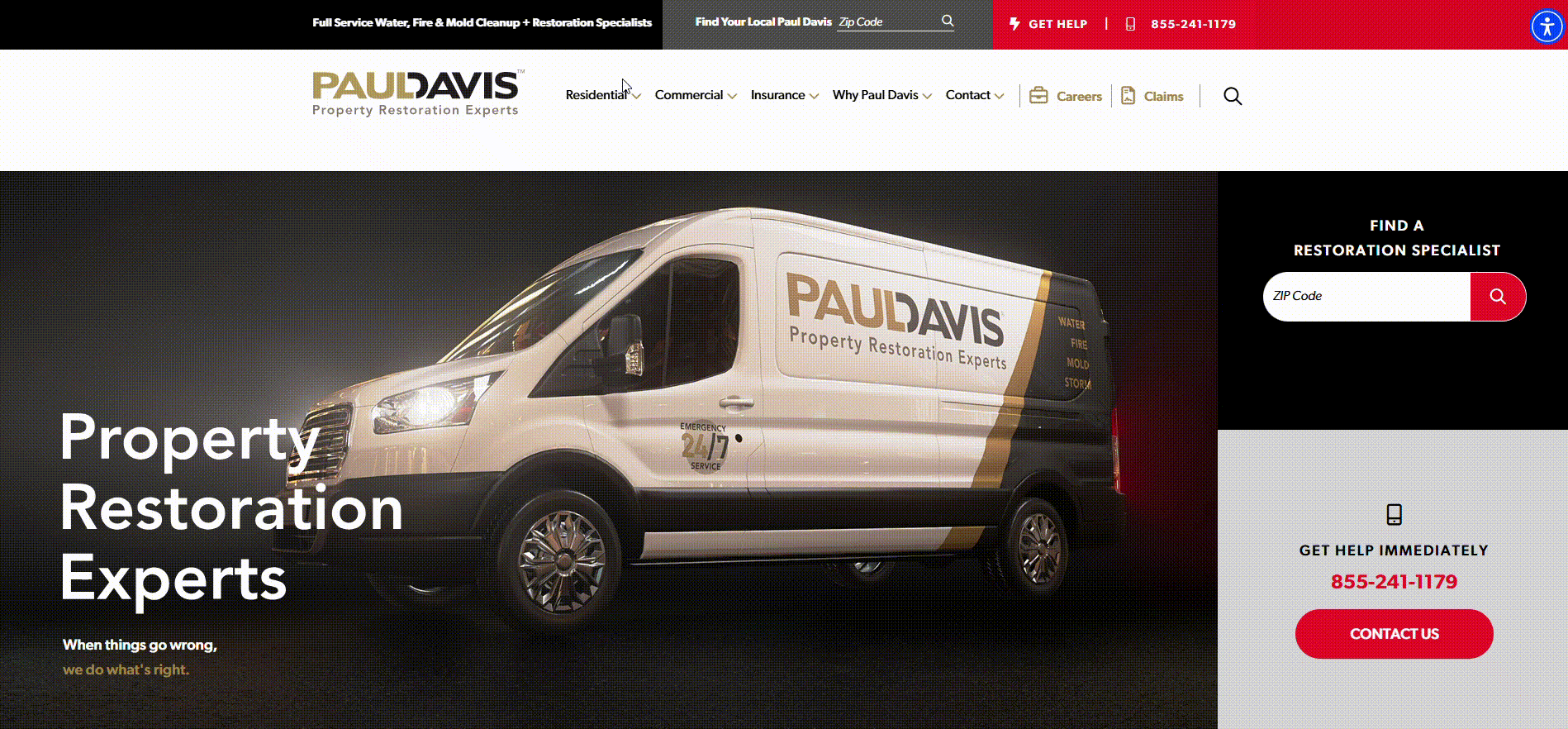
How to create deeply compelling content that hits:
- Write naturally: Carolyn Lyden of Search Hermit says, “Ensure you’re writing content the way that you’d explain it to someone over the phone.”
- Build content around real problems you see on jobs: Flooded basements, frozen pipes, smoke damage timelines. “Cheat” by using exact questions that clients ask.
- Go hyper-local: Mention neighborhoods, landmarks, and recent storms or weather events (E.g., “Frozen pipe water damage repair in Cleveland after January 15 cold snap”).
- Use real photos from real jobs: Keep GPS data intact (more on this below!) and write descriptive alt text (e.g., water-damage-restoration-project-in-Dallas-75201).
- Mix formats so clients don’t get bored: Combine blogs, videos, guides, and infographics instead of publishing articles upon articles.
As a callback to bullet point #4: “Keep GPS data intact”. This means don’t strip the location information from your photos before uploading them.
If you compress, resize, or export images the wrong way, that location data can get wiped out!
8. Finesse Your Technical SEO
We can feel your eyes glazing over. Stick with us!
Technical SEO is the nerdy (but important) stuff, like your site structure, mobile-friendliness, page speed, indexing, and code that helps Google understand your website.
It’s the quiet force behind SEO for restoration companies.
Here’s how to bump up your technical SEO game:
- XML Sitemap & Robots.txt: Your sitemap tells Google what pages exist; your robots.txt tells it what to crawl/ignore. Together, they make crawling faster and cleaner.
- Schema Markup & Structured Data: Schemas are “labels” that help Google understand your content.
For example: Leverage the FAQ Schema for your FAQ section to boost the chances of it appearing directly in search results. - Clean URL Structure: Your URLs should be simple, readable, and descriptive. Example: /water-damage-restoration-chicago.
- Website Speed & Core Web Vitals: Google reports that 53% of mobile users abandon your site if it takes longer than 3 seconds to load. Compress images, reduce bloat, and prioritize mobile performance.
Extra Tips!
- The “Summary” Box: Add a 2–3 sentence summary at the top of each blog. Google often pulls this for Featured Snippets, putting you in Position #0.
- Clickable Table of Contents: For long guides, use a table of contents. This generates jump links in search results.
- Service Area Map Embeds: Embed a Google Map showing your service area at the bottom of blogs and guides. It reinforces geographic relevance.
We know, this isn’t glamorous at all. But GVN Marketing asserts that if you ignore technical SEO, you could destroy user trust and your search engine rankings.
9. Mobile Optimization for a Restoration Website
Does your website look fabulous on mobile?
Over 64% of your prospects will look at your site from their phones. But sadly, a lot of sites are a clumsy, cluttered mess!
Restoration Canada has a great mobile site with fast load times, clear content, simple navigation, and obvious call or text options!
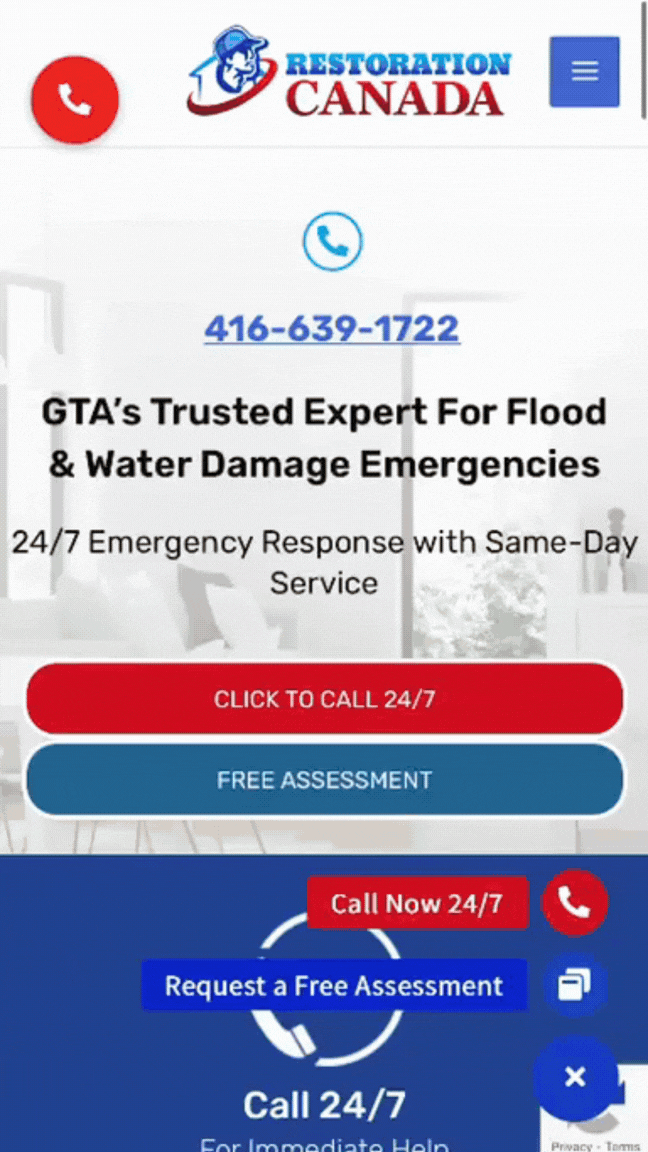
How to build a mobile-friendly restoration site:
- Pick responsive tools: Use free builders like Wix or WordPress themes with Bootstrap; they stack content neatly on small screens.
- Easy menus and buttons: Hide big menus in a hamburger icon (three lines), and make buttons thumb-sized, so their fingers don’t miss.
- Keep key actions visible: Place call or text buttons above the fold and accessible as users scroll.
- Reduce load time: Compress images, remove heavy animations, and limit scripts so pages load quickly.
- Limit form fields: Ask only for essential information to reduce friction during high-stress situations.
- Test on your phone: Check with SE Ranking’s free Mobile-Friendly tool.
Pro Tip: Avoid pop-ups on mobile. It only increases annoyance and distracts from the contact button.
10. Internal Link Building for Restoration
It’s time to juice up your site with internal linking!
This is a genius way to let Google know how your site is structured.
Internal linking is when you connect pages on your own website by linking from one page to another. This helps visitors and search engines easily navigate your content.
Increv found that pages with 3–5 strong internal links keep visitors on the site about 25% longer!
Best ways to use internal linking on your website:
- Navigation links: Links in your header or footer that give visitors instant access to your most important pages (Services, Locations, and Contact).
- Service-to-service links: Links between related services that help users understand everything you offer
- Service-to-location links: Links that connect specific services to the areas you serve, reinforcing where each service is available.
- Blog-to-service links: Links from educational blog posts to relevant service pages that guide readers from research to action.
- Blog-to-blog links: Links between related blog posts that keep visitors engaged and encourage them to explore more helpful content.
For restoration sites, definitely use internal link silos.
Example: In a blog post about protecting your home after a house fire, link the phrase “fire damage restoration” directly to your fire damage restoration service page.
It’s pretty simple and incredibly valuable!
11. Link Building
Piggybacking off point #10, your linking job isn’t done yet!
Let’s talk about external link building (or backlinks). It’s like a giant cool kids club, where other websites link to yours, telling Google you’re legit.
Is link building important? YES!
Link building strengthens trust, authority, and local visibility. These are key components of Google’s E-E-A-T (Experience, Expertise, Authoritativeness, Trust). Quality of links matters more than volume.
We suggest these top tips to earn backlinks:
- Guest posting & link insertions: Get links from sources like local news sites, or home improvement publications like Patch (Contribute local storm-recovery tips) or PropertyCasualty360.
- Directory listings: Get listed on reputable home services directories like Better Business Bureau, the U.S. Chamber of Commerce, and industry associations to reinforce legitimacy.
- Citations: Callback to point #5! Keep your business name, address, and phone number identical across platforms.
- Prioritize relevance over quantity: One link from a credible, relevant site carries more weight than dozens of low-quality links.
- Support E-E-A-T: Backlinks from authoritative, industry-related websites help prove your experience, expertise, and trustworthiness to Google.
Yes, this is kind of boring, but it’s vital.
Top-ranking pages on Google have upwards of 3,800 links, cementing their expertise in Google’s eyes.
12. Digital PR for Restoration Companies
This works brilliantly, but you must structure it well.
Digital PR is the practice of earning online coverage (mentions, quotes, and backlinks) from credible media outlets, industry publications, and trusted websites.
How do you get those backlinks? Share your expert insights, data, or timely stories that journalists want to publish.
- Find the right pitch: Lead with topics journalists salivate over, like storm damage trends, insurance delays, or seasonal risks.
- Real data: Support your pitch with statistics, internal job data, or case studies to make the story pop.
- Expertise: Offer quotes or guidance from experienced restoration professionals.
- Right publications: Pitch outlets such as This Old House (homeowner-focused authority), or Business Insider (large-scale media exposure).
- Clear outreach: Send short, value-focused emails that explain why the story matters now and how it helps their audience.
The Main Takeaway: No business is an island. You need credible voices outside your website backing you up.
13. Social Media for Restoration Companies
Put the hula skirt away. You don’t have to dance on TikTok.
Even simple, consistent posts can go a very long way.
Romexterra does a great job on their Facebook, often pulling dozens of likes and shares per post!
In one post, they connect their restoration work to a recent local fire, showing up not just as a service provider but as part of the community.
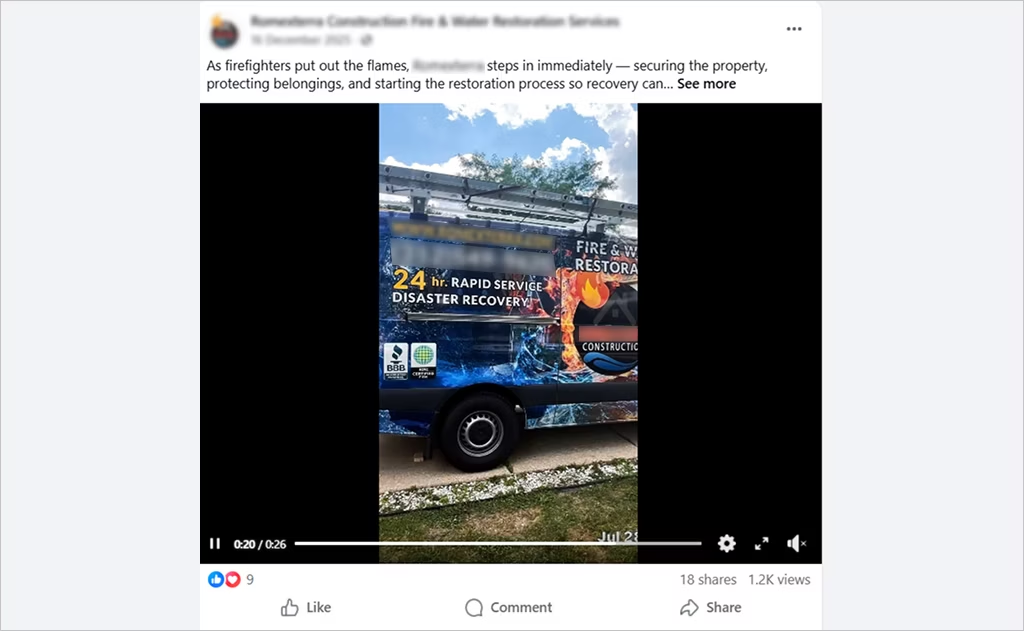
And contrary to popular belief, social media does play a role in SEO for restoration companies!
AI SEO confirms, “An active social media presence makes it easier and faster to rank your site as search engines attribute authority based on tweets, shares, likes, and Google +1s.”
Use social media to:
- Share emergency tips and quick guidance during local storms, floods, or freezes
- Post real job photos and short videos to show active work in your service area
- Highlight reviews, testimonials, and completed projects, and profusely thank your community
- Drive traffic back to key service pages and blog content
- Engage with your comments; it’s a great way to cement your status as a beloved community pro
Want to crush your social media presence? Read our guide: Social Media Marketing for Restoration Companies.
14. Track the Success of Your Restoration Business
Alright, deep breath. You made it!
Now comes the part that quietly ties this all together.
Let’s track your efforts. We need to see whether real people are calling and hiring you for their projects.
P.S. Empty metrics like “traffic” are fine, but we’re looking for real-world indicators:
- Phone calls from your site and Google Business Profile
- Form fills and text requests from service pages
- Booked jobs, not just leads — leads do not keep the lights on
- Which pages generate the most calls
- Drop-off points where visitors hesitate or leave
Tracking makes you 2 times more likely to crush your goals, so DO NOT skip this step! Block off one hour a week to review what’s working and look for weak spots to improve upon.

Rank Higher. 2X Your Jobs with Restoration SEO!
Nice work. You just walked through the full playbook for SEO for restoration companies.
But as Jes Scholz (Digital Director at Ringier AG) points out,“Impactful SEO is rarely executed by a lone wolf.”
We agree! Restoration is a shark tank with hungry companies, all eyeing a small pool of leads.
Your top competitors are already boosting their visibility, owning Google Maps, and staying booked with hundreds of calls every month.
To catch up, you need expertise spanning 15+ years at a minimum!
Ask about Comrade’s restoration SEO services. Our experts have helped businesses see up to 400% more leads in the first 12 months alone. 300+ clients are thriving because of it!
That kind of growth only happens with an expert by your side.
Take control. Get clients to call YOU first.
Book your free growth call today.
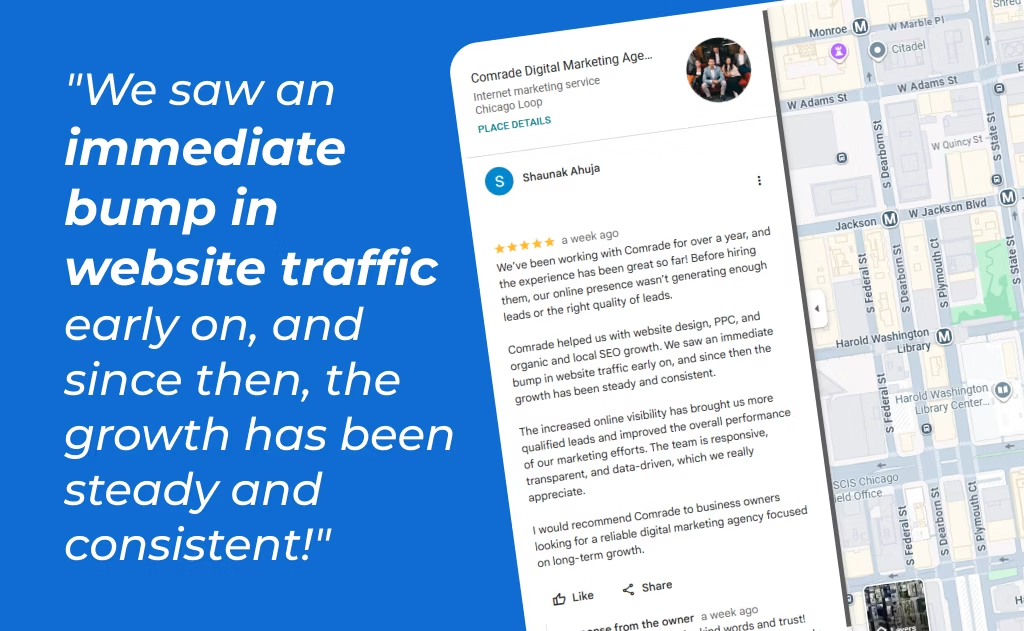
FAQs on SEO for Restoration Companies
-
What is the typical timeframe for seeing measurable results from a restoration SEO campaign?
With SEO for restoration companies, you’ll usually start noticing early signs within 2–3 months (like better visibility or more calls). But real revenue momentum, where leads feel consistent, typically builds over 4–6 months as authority, content, and local signals take time to compound.
-
What is the difference between local SEO and national SEO for service-based businesses?
Local SEO puts your business in front of people nearby by targeting things like “emergency water damage restoration in Phoenix”. General SEO targets broad, non-location searches like “water damage restoration services”. For restoration companies, local SEO is the winner. Homeowners want a fast, local response, not a company three cities away.
-
How does a Google Business Profile impact local search visibility?
Your Google Business Profile is a major driver of visibility in SEO for restoration companies. It helps you appear in Google Maps (a high-traffic spot), shows off your reviews and photos, and often becomes the deciding factor in whether someone calls you or not.


